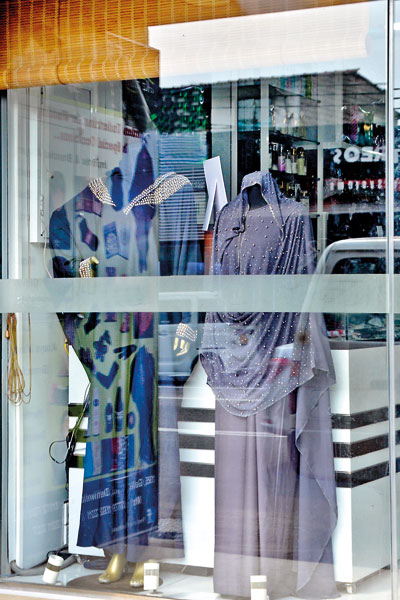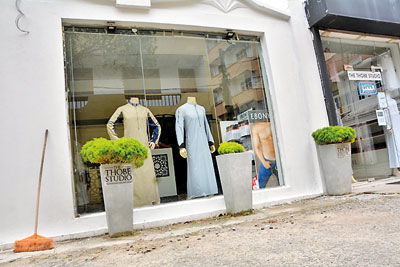News
Muslim fashion stores hemmed by niqab ban

Customised abayas, niqabs and burqas for sale. Pix by Ishanka Sunimal
In the wake of the Government banning face coverings following the Easter Sunday bombings, a cross section of those specialising in Muslim women’s attire and members of the community expressed their views on the ban.
At a store in Colombo that has been providing customised abayas, niqabs and burqas to their clientele for nearly 25 years in traditional designs, a touch of glamour is seen with the beadwork, stonework and embroidery.
The proprietor who did not want to be named said they should all respect the law of the country even though they are saddened by the ban. “Just because a group of extremists did something wrong, the entire community had to pay the price for it,” she stated.
Many of the stores had different coloured hijabs, shawls, abayas, gloves and accessories such as ‘attar’ (a non-alcoholic oil-based perfume). The abayas – robe-like dresses — were sewn in different styles whilst keeping the loose-fitting requirement with bat sleeves, pleats, two-toned fabrics, lacework and more, in line with current fashion trends.
Earlier women chose black for their abayas, as it attracts the least attention. However with the recent ban, they are avoiding black and opting for more muted colours. The trends have begun to shift towards subtle shades yet still following the religious obligations.
In Dehiwala, at another Muslim ladies’ wear store offering trendy and elegant clothing, the proprieter herself wears the niqab. She says she feels the impact of the ban. “I invested a large amount of money and one of my niqab orders for the season got delivered only two weeks ago. Ever since, none of them has been sold,” she says.
The store remains closed at the moment, as she feels uncomfortable without her regular niqab to come before customers. “I had been wearing the niqab from a young age and now it’s difficult to suddenly open up and reveal ourselves. I felt safe in niqab even when I’m travelling alone for my business purchases. But now we are unable to step out of the house for our daily chores.”
Yusuf Ahmed who owns Az Zain (Pvt) Ltd, a store that sells designer abayas, told us that business was as usual, but now he followed the government ban and the All Ceylon Jamiyyathul Ulama’s advice. “We have been selling designer abayas which are more colourful and fashionable. We do have black ones in stock and hope once everything is sorted they will get sold.”
Most of the shop owners reiterate that as Sri Lankans and Muslims that they fully abide and respect the law of the country and strongly believe that national security is the top most priority. However, for many Muslim women, who had been wearing the niqab or the burqa, it will take some time for them to adjust to the new situation.
| Different ways to cover the female body It is stated in the Quran that it is obligatory for women to cover their heads and body. This is done to maintain modesty and privacy from non-mahram (unrelated) males. In Chapter 24 of the Quran, Surah An-Nur verse 30 depicts the covering of women as “…and not display their beauty except what is apparent, and they should place their khumur over their bosoms…” A khumur can be interpreted as either a veil or a headscarf. This leads to the different ways Muslim women choose to veil themselves.Some women wear hijabs (a common term for veils), a head cover that is worn by wrapping a shawl tightly around the head and placing it so it covers the bosom or wearing a two-piece veil called an al-amira which consists of a close-fitting cap, usually made from cotton or polyester, and a tube-like scarf that covers their head and neck. A niqab is a veil that covers the woman’s face leaving only her eyes visible. This can come with her hijab or be tied as a separate item onto her face. A burqa is a one piece veil that covers the entire face and body, with mesh material around the eyes for vision. Along with veils they wear an Abaya, which is a loose fitting garment like a robe. Traditionally it is made in black, as women are not supposed to draw attention to themselves, nor reveal the shape of their body. However, due to modernisation and in different cultures, abayas have become more colourful and sometimes have patterns and embellishments. | |

Even Muslim men's fashions

